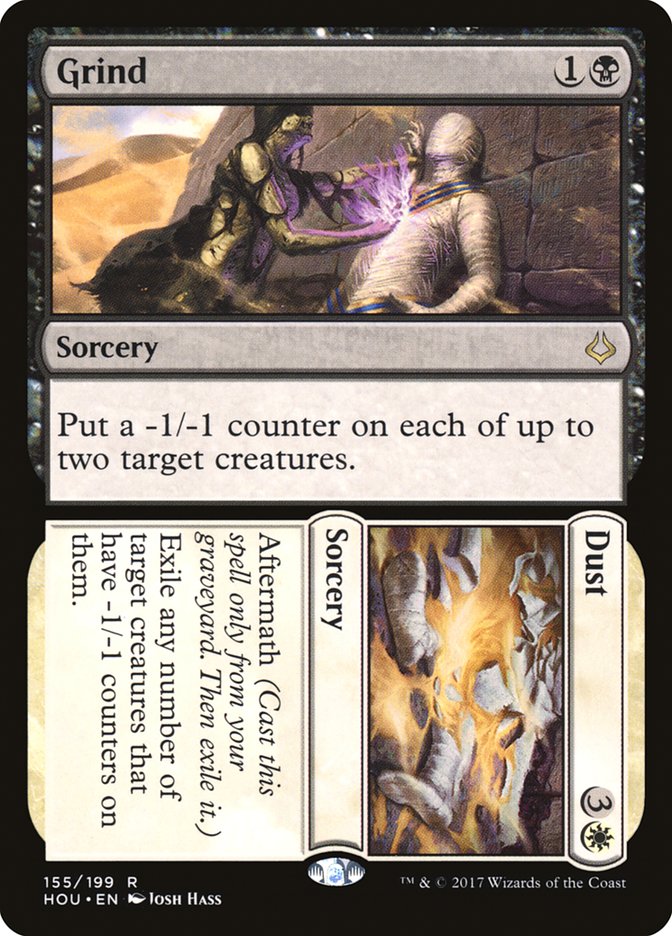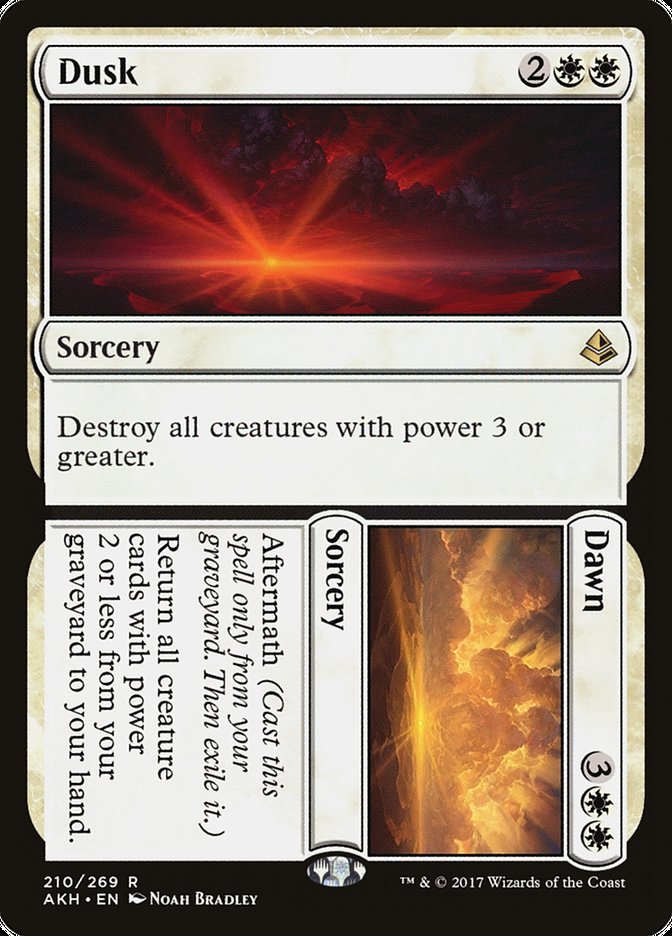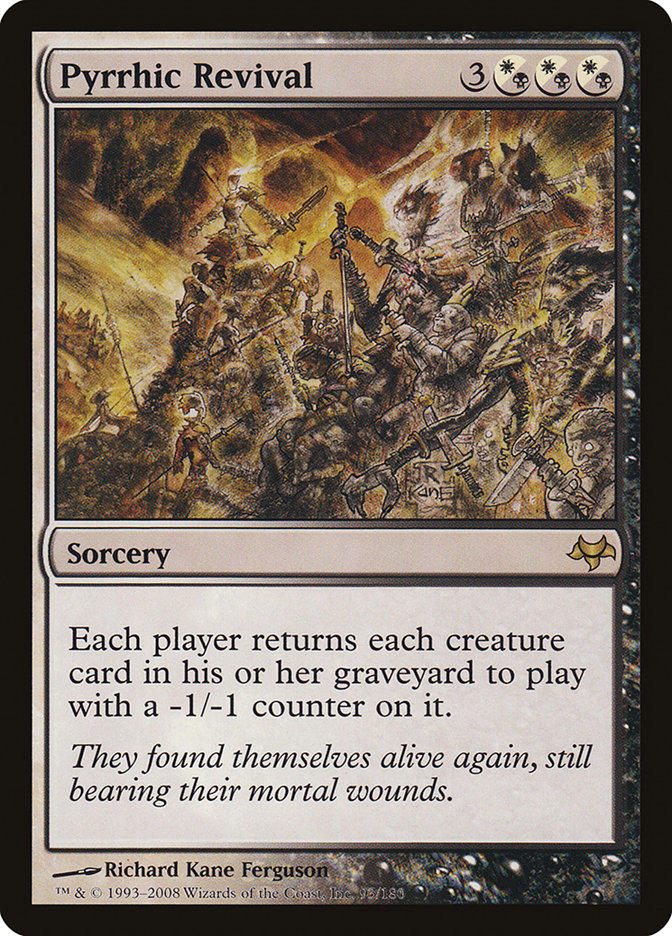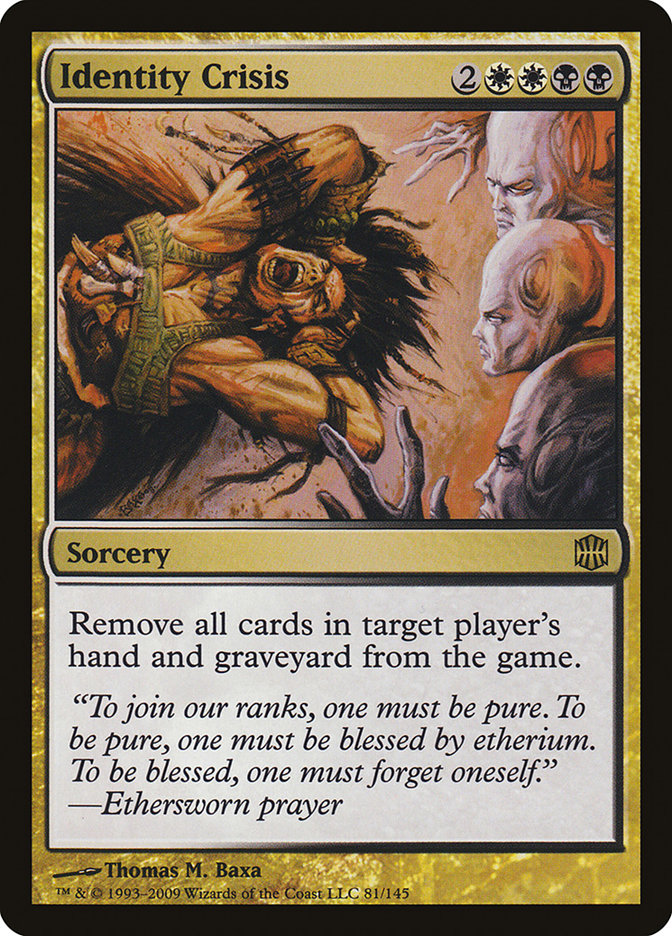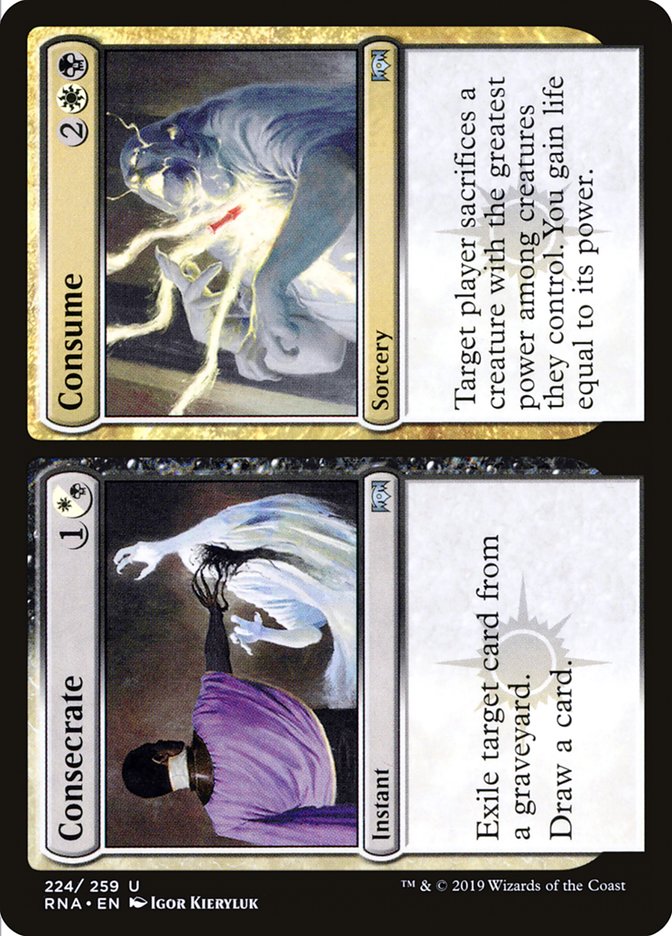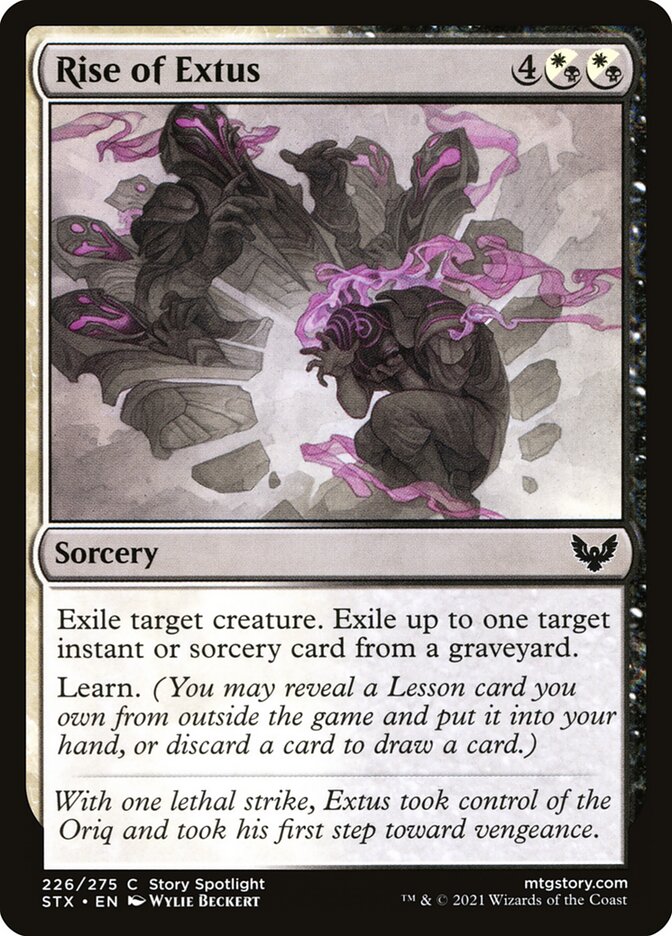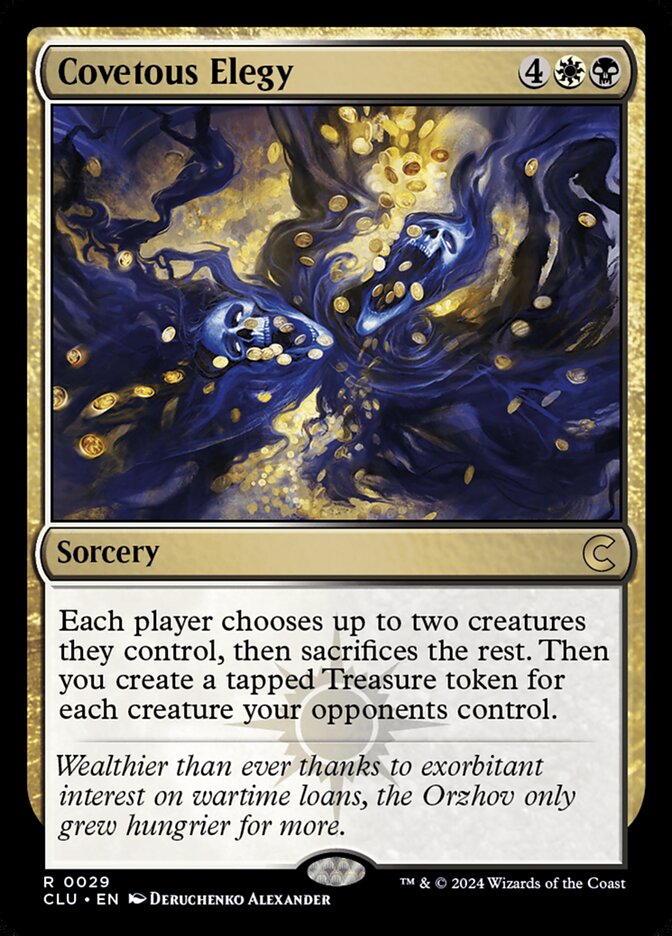Reduzir // Pó Carta MTG
| Expansões | Lançada em 4 expansõesVer todas |
| Custo de mana | |
| Custo convertido de mana | 6 |
| Raridade | Rara |
| Tipo | Feitiço |
| Habilidades | Aftermath |
Texto da carta
Consequências (Conjure esta mágica somente de seu cemitério. Depois, exile-a.) Exile qualquer número de criaturas alvo que tenham marcadores -1/-1.
Cartas similares a Reduzir // Pó
Grind // Dust holds a unique position in Magic: The Gathering’s vast array of split cards, offering a flexible approach to board control. Comparatively, cards like Legion’s End share a semblance with Grind, allowing the removal of creatures with the same name and power threshold; however, Grind’s ability to distribute -1/-1 counters can target multiple creatures, showcasing its versatility in different game scenarios.
Another noteworthy parallel is found in Dusk // Dawn. Much like the Dust half, this card deals with creatures based on power, but Dusk // Dawn focuses on destroying them outright instead of exiling. The critical difference lies in Dust’s exile effect, which can be a significant advantage, denying opponents any chance of retrieving their creatures from the graveyard.
Upon examination, Grind // Dust distinguishes itself with its two-part mechanic, combining targeted debuffing with the potential to sweep an opponent’s board. Given its strategic depth and flexibility in gameplay, it is a card that players may find indispensable for fine-tuned creature management and maintaining the upper hand in duels.
Cartas semelhantes a Reduzir // Pó por cor, tipo e custo de mana
Card Pros
Card Advantage: Grind // Dust grants a unique form of card advantage by placing -1/-1 counters on opposing creatures, potentially clearing the board when leveraged properly. This sets the stage for later plays, effectively diminishing your opponent’s resources while maintaining your own creature strength.
Resource Acceleration: While the card itself doesn’t directly accelerate resources like mana, the ability to effectively remove enemy threats can be seen as a form of indirect resource acceleration. Clearing the board with Grind can preserve your life total and mana that would otherwise be spent on dealing with those threats.
Instant Speed: Dust, the aftermath half of this card, can be cast at instant speed, allowing you to respond to your opponent’s moves by exiling creatures on their turn. This timing flexibility gives you the power to adjust your strategy dynamically, making it a key feature for control decks.
Card Cons
Discard Requirement: In the case of Grind // Dust, lacking cards to discard doesn’t apply directly since the card doesn’t impose such a cost. Nonetheless, players must always be mindful of their hand size to maintain strategic options, and this becomes increasingly relevant when considering deck synergy and overall strategy.
Specific Mana Cost: Grind // Dust requires both white and black mana, which could potentially limit its viability strictly to multicolored decks that can meet this requirement, reducing its flexibility in mono-colored or other deck archetypes that don’t support these colors.
Comparatively High Mana Cost: The combined cost to utilize both halves of the card is six mana. In fast-paced games, the time it takes to reach the appropriate mana levels may render it less effective compared to lower cost options that can offer quicker board impact. Players may opt for alternatives that provide immediate results over setting up for a potential future combo provided by Grind // Dust.
Reasons to Include in Your Collection
Versatility: Grind // Dust offers flexibility in gameplay, capable of handling multiple creatures with its -1/-1 counters and providing a mass removal option. This card can easily fit into decks that manipulate or benefit from counters.
Combo Potential: This card can synergize well with other -1/-1 counter strategies or with cards that capitalize on creature deaths, allowing for potentially game-changing combos and board control.
Meta-Relevance: With creatures being a staple in many decks, Grind // Dust holds its ground by being an efficient removal tool, disrupting opponent strategies and swinging the game state, making it relevant in a creature-heavy meta.
How to beat Grind // Dust
Grind // Dust can be a formidable asset in any player’s arsenal, contributing both to creature control and board presence. When facing this split card, proactive strategies are key. Firstly, consider the value of hexproof or shroud abilities, which can effectively safeguard your creatures from being targeted by Grind’s -1/-1 counters. Additionally, since Dust requires creatures with -1/-1 counters on them to function, avoiding overextension onto the battlefield can limit its impact, forcing your opponent to gain minimal advantage from the wipe effect.
Indestructibility also proves to be a formidable defense against Grind // Dust. Cards such as Selfless Spirit can not only resist the removal attempt but also protect your entire crew. Counterspells, naturally, provide a direct answer to prevent the card from resolving in the first place. Moreover, utilizing graveyard retrieval spells can instantly negate the setback, swiftly bringing your key creatures back into play. It’s crucial to adapt a versatile game plan, utilizing these methods to efficiently neutralize the threat of Grind // Dust and maintain dominance on the battlefield.
Understanding your deck’s strengths and vulnerabilities against such removal tactics can dramatically increase your resilience. Keep these strategies in mind, and Grind // Dust will become far less daunting, allowing you to maintain the upper hand and drive your game towards victory.
Onde comprar
Se você deseja comprar um cartão Reduzir // Pó MTG de um conjunto específico como Hour of Devastation and Hour of Devastation Promos, há diversas opções confiáveis a serem consideradas. Uma das principais fontes é a loja de jogos local, onde muitas vezes você pode encontrar boosters, cartas individuais e decks pré-construídos de conjuntos atuais e de alguns conjuntos anteriores. Eles geralmente oferecem o benefício adicional de uma comunidade onde você pode negociar com outros jogadores.
Para um inventário mais amplo, especialmente de conjuntos mais antigos, mercados on-line como TCGPlayer, Card Kingdom e Card Market oferecem seleções extensas e permitem que você pesquise cartas de conjuntos específicos. Grandes plataformas de comércio eletrônico, como eBay e Amazon, também têm listagens de vários vendedores, o que pode ser um bom lugar para procurar produtos lacrados e achados raros.
Além disso, o site oficial do Magic geralmente tem um localizador de lojas e listas de varejistas para encontrar a Wizards of the Produtos licenciados pela Costa. Lembre-se de verificar a autenticidade e a condição dos cartões ao comprar, especialmente de vendedores individuais em mercados maiores.
Abaixo está uma lista de alguns sites de lojas onde você pode comprar os Reduzir // Pó e outras cartas MTG:
 COMPRAR
COMPRAR BurnMana é parceiro oficial da TCGPlayer
- eBay
- Card Kingdom
- Card Market
- Star City Games
- CoolStuffInc
- MTG Mint Card
- Hareruya
- Troll and Toad
- ABU Games
- Card Hoarder Magic Online
- MTGO Traders Magic Online
Veja produtos de MTG
Expansões
A carta Reduzir // Pó Magic the Gathering foi lançada em 4 expansões diferentes entre 2017-07-14 e 2020-08-13. Ilustrado por Josh Hass.
| # | Lançamento | Nome | Código | Símbolo | Número | Moldura | Layout | Borda | Artista |
|---|---|---|---|---|---|---|---|---|---|
| 1 | 2017-07-14 | Hour of Devastation | HOU | 155 | 2015 | Consequências | Preta | Josh Hass | |
| 2 | 2017-07-15 | Hour of Devastation Promos | PHOU | 155s | 2015 | Consequências | Preta | Josh Hass | |
| 3 | 2020-08-13 | Amonkhet Remastered | AKR | 237 | 2015 | Consequências | Preta | Josh Hass | |
| 4 | The List | PLST | HOU-155 | 2015 | Consequências | Preta | Josh Hass |
Legalidades
Magic the Gathering formats where Reduzir // Pó has restrictions
| Formato | Legalidade |
|---|---|
| Historicbrawl | Válida |
| Historic | Válida |
| Legacy | Válida |
| Oathbreaker | Válida |
| Gladiator | Válida |
| Pioneer | Válida |
| Commander | Válida |
| Modern | Válida |
| Vintage | Válida |
| Duel | Válida |
| Explorer | Válida |
| Penny | Válida |
| Timeless | Válida |
Regras e informações
O guia de referência para regras de cartas de Magic: The Gathering Reduzir // Pó fornece decisões oficiais, quaisquer erratas emitidas, bem como um registro de todas as modificações funcionais que ocorreram.
| Data | Texto |
|---|---|
| 2017-04-18 | A spell with aftermath cast from a graveyard will always be exiled afterward, whether it resolves, it’s countered, or it leaves the stack in some other way. |
| 2017-04-18 | All split cards have two card faces on a single card, and you put a split card onto the stack with only the half you’re casting. The characteristics of the half of the card you didn’t cast are ignored while the spell is on the stack. For example, if an effect prevents you from casting green spells, you can cast Destined of Destined // Lead, but not Lead. |
| 2017-04-18 | Each split card has two names. If an effect instructs you to choose a card name, you may choose one, but not both. |
| 2017-04-18 | Each split card is a single card. For example, if you discard one, you’ve discarded one card, not two. If an effect counts the number of instant and sorcery cards in your graveyard, Destined // Lead counts once, not twice. |
| 2017-04-18 | If another effect allows you to cast a split card with aftermath from a graveyard, you may cast either half. If you cast the half that has aftermath, you’ll exile the card if it would leave the stack. |
| 2017-04-18 | If another effect allows you to cast a split card with aftermath from any zone other than a graveyard, you can’t cast the half with aftermath. |
| 2017-04-18 | If you cast the first half of a split card with aftermath during your turn, you’ll have priority immediately after it resolves. You can cast the half with aftermath from your graveyard before any player can take any other action if it’s legal for you to do so. |
| 2017-04-18 | Split cards with aftermath have a new frame treatment—the half you can cast from your hand is oriented the same as other cards you’d cast from your hand, while the half you can cast from your graveyard is a traditional split card half. This frame treatment is for your convenience and has no rules significance. |
| 2017-04-18 | While not on the stack, the characteristics of a split card are the combination of its two halves. For example, Destined // Lead is a green and black card, it is both an instant card and a sorcery card, and its converted mana cost is 6. This means that if an effect allows you to cast a card with converted mana cost 2 from your hand, you can’t cast Destined. This is a change from the previous rules for split cards. |
| 2017-07-14 | If one of Dust’s target creatures loses its -1/-1 counters, leaves the battlefield, or otherwise becomes an illegal target before the spell resolves, it won’t be exiled, but the remaining legal targets will be exiled. |
| 2017-07-14 | Once you’ve started to cast a spell with aftermath from your graveyard, the card is immediately moved to the stack. Opponents can’t try to stop the ability by exiling the card with an effect such as that of Crook of Condemnation. |
| 2017-07-14 | You can’t target the same creature twice with Grind to give it two -1/-1 counters. |
